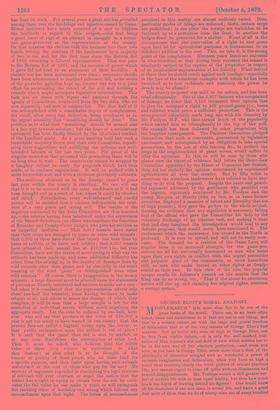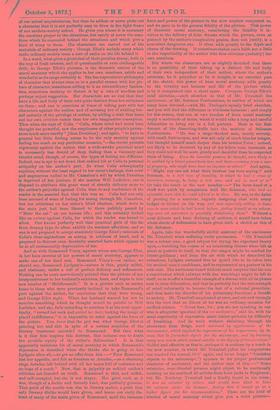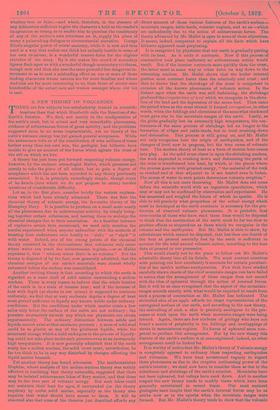GEORGE ELIOT'S MORAL ANATOMY.
" ATIDDLEMARCEI" bids more than fair to be one of the great books of the world. There are, as we have often noted, tones and undertones in it that are not to our liking, and that to a certain extent jar with the large and genial freedom of delineation that is of the very essence of George Eliot's beet manner. But no writer who aims as high as George Eliot, can be free from visible defects,—it is only the well-marked limi- tation of Miss Austen's aim and field of view which enables her to be in her own way all but absolute perfection,—and when you have, as you have in George Eliot, much more than a dash of the philosophy of character mingled with so wonderful a power of accurate imagination and delineation, when you have so high a moral ideal touching closely the vivid picture of minute practical life, you cannot expect to come off quite without dissonances and inward disappointments. Mr. Trollope scours a still greater sur- face of modern life with at least equal fidelity, but then how much less is the depth of drawing behind his figures ! One would know all his characters if one met them in actual life, and know a great deal more of them than we do of ninety, nine out .of every hundred
of our actual acquaintances, but then he seldom or never picks out a character that it is not perfectly easy to draw in the light fresco of our modern-society school. He gives you where it is necessary the emotions proper to the situations, but rarely or never the emo- tions which lie concealed behind the situations and which give a kind of irony to them. His characters are carved out of the materials of ordinary society ; George Eliot's include many which make ordinary society seem a sort of satire on the life behind it.
In a word, what gives a great deal of their peculiar stamp, both in the way of fresh interest, and of questionable or even challengeable drift, to George Eliot's pictures, is the theoretic nature of the moral anatomy which she applies to her own creations, subtle and wonderful as its range certainly is. She has a speculative philosophy of character that always runs on in a parallel stream with her pie- tare of character, sometimes adding to it an extraordinary fascina- tion, sometimes seeming to distort it by a vein of needless and perhaps unjust suggestion. Her characters are so real that they have a life and body of their own quite distinct from her criticisms on them ; and one is conscious at times of taking part with her characters against the author, and of accusing her of availing her- self unfairly of the privilege of author, by adding a trait that bears out her own criticism rather than her own imaginative conception. Thus when she says of Celia, "Celia, whose mind had never been thought too powerful, saw the emptinesss of other people's preten- sions much more readily" (than Dorothea]; and again, "to have in general but little feeling seems to be the only security against feeling too much on any particular occasion,"—the reader protests vigorously against the notion that a wide-awake practical mind is necessarily lees devoid of deep feeling than a visionary and idealist mind, though, of course, the types of feeling are different. Indeed, one is apt to set down that unkind hit at Celia to personal antipathy on the author's part. So when Celia subsequently explains, without the least regard to her sister's feelings, that cruel and ungenerous codicil to Mr. Casaubon's will by which Dorothea is deprived of her jointure if she marries Will Ladislaw, one is disposed to attribute this great want of sisterly delicacy more to the author's prejudice against Celia than to any confidence of the reader in the asserted fact that this was so. Celia had not only been accused of want of feeling for seeing through Mr. Casaubon, but her criticisms on her sister's blind idealism, which were in the main just, had been likened to those publicly passed by " Marr the cat" on our human life ; and this certainly looked like an animus against Celia, for which the reader was bound to allow. One knows perfectly well that practical girls of this far from dreamy type do often exhibit the warmest affections, and so one is not prepared to accept absolutely George Eliot's rationale of Celia's clear-sightedness as arising in coldness of heart, and is prepared to distrust even decidedly asserted facts which appear to be at all unreasonabbi depreciative of her.
And so with Rosamond Vincy, against whom also George Eliot, in her keen exercise of her powers of moral anatomy, appears to make one of her dead sets. Rosamond Vincy's —or rather, we should say, Rosamond Lydgate's—nature is thin, gently selfish, and obstinate, under a veil of perfect delicacy and refinement. 'Nothing can be more marvellously painted than the picture of her irresponsiveness to her husband's anxieties, fears, and hopes in this new number of " Middlemarch." It is a picture such as carries home to those who were previously inclined to take Rosamond's part against the author, the conviction that they were wrong, and George Eliot right. When her husband warned her not to mention something which he thought would be painful to Will Ladislaw, and she, fully intending to mention it at the next oppor- tunity, "turned her neck and patted her hair, looking the image of placid indifference," it is impossible to rebel against the force of the picture. You know that the girl was what George Eliot is painting her, and this in spite of a certain suspicion of the literary treatment accorded to Rosamond. But then what is it that first inspires this distrust, that induces one to doubt the possible equity of the writer's delineation ? It is that apparently malicious bit of moral anatomy in which Rosamond's depression is described when she thinks she is going to lose Lydgate after all,—to get no offer from him :—" Poor Rosamond lost her appetite, and felt as forsaken as Ariticlne,—as a charming stage Ariadne left behind with all her boxes full of costumes and no hope of a coach." Now, that is palpably an unkind author's criticism not founded on truth. Rosamond is thin, and selfish, and self-occupied, but she is not stagey. Her grief, such as it was, though of a feeble and thready kind, was perfectly genuine. That prick of the needle was due to literary malice, a prick that only literary dislike would have given, and hence our early dis- trust of many of the traits given of Rosamond, until the immense force and power of the picture in the new number conquered us, and we gave in to the general fidelity of the picture. This power of theoretic moral anatomy, considering the liability it in- volves to the delivery of false thrusts which the picture, even as painted by the author's imaginative genius, does not justify, is a somewhat dangerous one. It often adds greatly to the depth and charm of the drawing. It sometimes shakes one's faith not a little in the impartiality of the author who thus criticises (unfairly) her own creations.
But where the characters are so slightly sketched that there is no possibility of their taking up a distinct life and body of their own independent of their author, where the author's criticism, be it prejudice or be it insight, is an essential part- of the sketch, this power of keen moral anatomy adds greatly to the vivacity and humour and life of the picture which is by it compressed into a short space. Compare George Eliot's brief sketches,—such sketches as that of Mr. Trumbull the auctioneer, or Mr. Solomon Featherstone, to neither of which are many lines devoted,—with Mr. Trollope's equally brief sketches, and you will find the difference in vividness immense ; and simply for this reason, that one or two touches of keen moral anatomy imply a multitude of traits, which it would take a long and careful delineation to bring out in a full portrait. Here is the first descent of the dissecting-knife into the motives of Solomon Featherstone. "He was a large-cheeked man, nearly seventy, with small, furtive eyes, and was not only of much blander temper, but thought himself much deeper than his brother Peter ; indeed, not likely to be deceived by any of his fellow-men, inasmuch as they could not well be more greedy and deceitful than he suspected them of being. Even the invisible powers, he thought, were likely to be soothed by a bland parenthesis here and there—coming from a man of property, who might have been as impious as others." And again, "'Might any one ask what their brother has been saying?' said Solomon, in a soft tone of humility, in which he had a sense of luxurious cunning, he being a rich man and not in need of it." Or take the touch in the new number :—" The hour-hand of a clock was quick by comparison with Mr. Solomon, who had an agreeable sense that he could afford to be slow. He was in the habit of pausing for a cautious, vaguely designing chat with every hedger or ditcher on his way, and was especially willing to listen even to news which he had heard before, feeling himself at an advan- tage over all narrators in partially disbelieving them." Without a most delicate and keen divining of motives, it would have taken whole sheets of delineation to have given such a sketch as this of Mr. Solomon.
Again, take the wonderfully skilful anatomy of the auctioneer Mr. Trumbull when suffering under pneumonia. "Mr. Trumbull was a robust man, a good subject for trying the expectant theory upon,—watching the coarse of an interesting disease when left as much as possible to itself, so that the stages might be marked for future guidance ; and from the air with which he described his sensations, Lydgate surmised that he voild like to be taken into his medical man's confidence, and be represented as ikpartner in his own cure. The auctioneer heard without much surprise that his was a constitution which (always with due watching) might be left to itself, so as to offer a beautiful example of a disease with all its phases seen in clear delineation, and that he probably bad the rare strength of mind voluntarily to become the test of a rational procedure, and thus make the disorder of his pulmonary functions a benefit to society. Mr. Trumbull acquiesced at once, and entered strongly into the view that an illness of his was no ordinary occasion for medical science. "Never fear, Sir ; you are not speaking to one who is altogether ignorant of the vie medicatrix," said her-with his usual superiority of expression made rather pathetic by difficulty of breathing. And he went without shrinking through his abstinence from drugs, much sustained by applications of the thermometer, which implied the importance of his temperature, by the sense that he furnished objects for the microscope, and by learning many new words which seemed suitable to the dignity of his secretions." Skilful and effective as that is, perhaps it is outdone by a touch in the new number, in which Mr. Trumbull (after his temperature has reached the normal 98.6° again, and he no longer "furnishes objects to the microscope,") appears in his proper professional character of auctioneer, and the author says of him :—" Some saturnine, sour-blooded persons might object to be continually insisting on the merits of all articles from boot. jacks to Berghems ; but Mr. Borthrop Trumbull had a kindly liquid in his veins ; he was an admirer by nature, and would have liked to have the universe under his hammer, feeling that it would go at a higher figure for his recommendation." These are the kind of touches of moral" anatomy which give you a vivid picture-
whether true or false,—and which, therefore, in the absence of any delineation sufficient to give the character a hold on the reader's imagination so strong as to enable him to question the consistency of any of the author's own criticisms on it, supply the place of many a painstaking dialogue or circumstantial narrative. George Eliot's singular power of moral anatomy, while it is now and then used in a way that makes one think her unjustly hostile to some of her own creations, is a wonderful reserve-force for the slighter sketches of the story. By it she makes the crowd of secondary figures flash upon us with a wonderful though momentary vividness, though now and then she uses the same powerful but dangerous in- strument so as to cast a misleading effect on one or more of those leading characters whose natures are far more familiar and whose destinies are far more interesting to us, than those of ninety-nine hundredths of the actual men and women amongst whom our lot is cast.




































 Previous page
Previous page